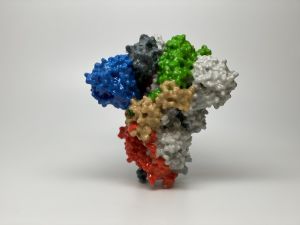Otro de los objetivos es el estudio del proteoma —el conjunto de proteínas presentes en el suero de los pacientes—, de modo que se puedan descubrir distintos paneles de proteínas que se alteran de forma coordinada durante el curso de la enfermedad y facilitar así el desarrollo de métodos de pronóstico y seguimiento. “Una de las cuestiones más interesantes desde el punto de vista de la investigación es saber cómo secuestra el virus a la maquinaria celular para multiplicarse y propagarse por el organismo. La comprensión de este fenómeno es un reto ambicioso cuyo abordaje es necesario para encontrar nuevas formas de tratar esta y otras enfermedades de similar naturaleza”, añade el investigador del CSIC.
Para ello, los científicos están analizando cómo se altera el proteoma de células pulmonares que expresan la proteína ACE2, puerta de entrada del SARS-CoV-2, modificando su función tras la infección gracias a la interacción con las proteínas virales. “Finalmente, estamos poniendo toda la tecnología de última generación de que disponemos para el análisis de proteínas al servicio de los laboratorios y empresas que desarrollan fármacos de naturaleza proteica, a modo de sofisticada plataforma de control de calidad. Pensamos que estos objetivos pueden proporcionar la base de nuevas estrategias de diagnóstico, terapia y vacunación, necesarias para controlar la presente pandemia y otras futuras”, indica Corrales.
La proteómica, una nueva tecnología para el estudio del SARS-CoV-2
La proteómica es una nueva tecnología de alto rendimiento que permite estudiar todas las proteínas de una muestra biológica o proteoma en su conjunto. Aplicada a la biomedicina, se utiliza, por ejemplo, para medir cuáles son las proteínas de la sangre de un paciente y sus cambios a medida que la infección progresa.
“Estas mediciones proporcionan datos de diagnóstico precisos y reproducibles a nivel molecular que pueden resultar de gran utilidad en el caso de la pandemia de la Covid-19, porque identifican las vías biológicas que sufren alteraciones a medida que avanza la enfermedad. A partir de los factores de riesgo genéticos, la proteómica proporcionará la evidencia crucial de las diferentes respuestas a la infección”, concluye Corrales.
La iniciativa forma parte de la Coalición Internacional Covid-19, cuyo fin es descubrir biomarcadores que determinen cómo responderá un individuo al virus, ayudar a los laboratorios hospitalarios a predecir el resultado de la enfermedad y orientar el tratamiento aplicable.






